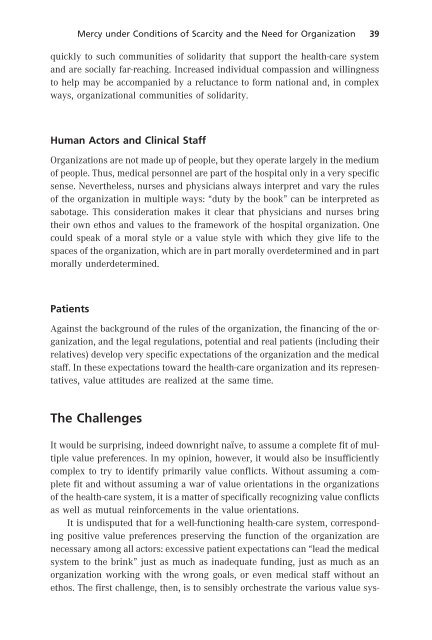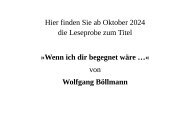Michael Welker | Eva Winkler | John Witte, Jr. | Stephen Pickard (Eds.): The Impact of Health Care (Leseprobe)
Pluralism has become the defining characteristic of many modern societies. Not only a plurality of individual and social claims and activities gain impacts on societal life. A creative pluralism of institutions and their norms profoundly shape our moral commitments and character – notably the family, the market, the media, and systems of law, religion, politics, research, education, health care, and defense. In the theoretical, empirical, and historical contributions to this volume, specialists on medicine, medical ethics, psychology, theology and health care discuss the many challenges that major transformations in their areas of expertise pose to the communication and orientation in late modern pluralistic societies. Contributors come from Germany, the USA and Australia.
Pluralism has become the defining characteristic of many modern societies. Not only a plurality of individual and social claims and activities gain impacts on societal life. A creative pluralism of institutions and their norms profoundly shape our moral commitments and character – notably the family, the market, the media, and systems of law, religion, politics, research, education, health care, and defense.
In the theoretical, empirical, and historical contributions to this volume, specialists on medicine, medical ethics, psychology, theology and health care discuss the many challenges that major transformations in their areas of expertise pose to the communication and orientation in late modern pluralistic societies. Contributors come from Germany, the USA and Australia.
Create successful ePaper yourself
Turn your PDF publications into a flip-book with our unique Google optimized e-Paper software.
Mercy under Conditions <strong>of</strong> Scarcity and the Need for Organization 39<br />
quickly to such communities <strong>of</strong> solidarity that support the health-care system<br />
and are socially far-reaching. Increased individual compassion and willingness<br />
to help may be accompanied by areluctance t<strong>of</strong>orm national and, in complex<br />
ways, organizational communities <strong>of</strong> solidarity.<br />
Human Actors and Clinical Staff<br />
Organizations are not made up <strong>of</strong> people, but they operate largely in the medium<br />
<strong>of</strong> people. Thus, medical personnel are part <strong>of</strong> the hospital only in avery specific<br />
sense. Nevertheless, nurses and physicians always interpret and vary the rules<br />
<strong>of</strong> the organization in multiple ways: “duty by the book” can be interpreted as<br />
sabotage. This consideration makes it clear that physicians and nurses bring<br />
their own ethos and values to the framework <strong>of</strong> the hospital organization. One<br />
could speak <strong>of</strong>amoral style or avalue style with which they give life to the<br />
spaces <strong>of</strong> the organization, which are in part morally overdetermined and in part<br />
morally underdetermined.<br />
Patients<br />
Against the background <strong>of</strong> the rules <strong>of</strong> the organization, the financing <strong>of</strong> the organization,<br />
and the legal regulations, potentialand real patients (including their<br />
relatives) develop very specific expectations <strong>of</strong> the organization and the medical<br />
staff. In these expectations toward the health-care organization and its representatives,<br />
value attitudes are realized at the same time.<br />
<strong>The</strong> Challenges<br />
It would be surprising, indeed downright naïve, to assume acomplete fit<strong>of</strong>multiple<br />
value preferences. In my opinion, however, it would also be insufficiently<br />
complex to try to identify primarily value conflicts. Without assuming acomplete<br />
fit and without assuming awar <strong>of</strong> value orientations in the organizations<br />
<strong>of</strong> the health-care system, it is amatter <strong>of</strong> specifically recognizing value conflicts<br />
as well as mutual reinforcements in the value orientations.<br />
It is undisputed that for awell-functioning health-care system, corresponding<br />
positive value preferences preserving the function <strong>of</strong> the organization are<br />
necessary among all actors: excessive patient expectations can “lead the medical<br />
system to the brink” just as much as inadequate funding, just as much as an<br />
organization working with the wrong goals, or even medical staff without an<br />
ethos. <strong>The</strong> first challenge, then, is to sensibly orchestrate the various value sys-
















